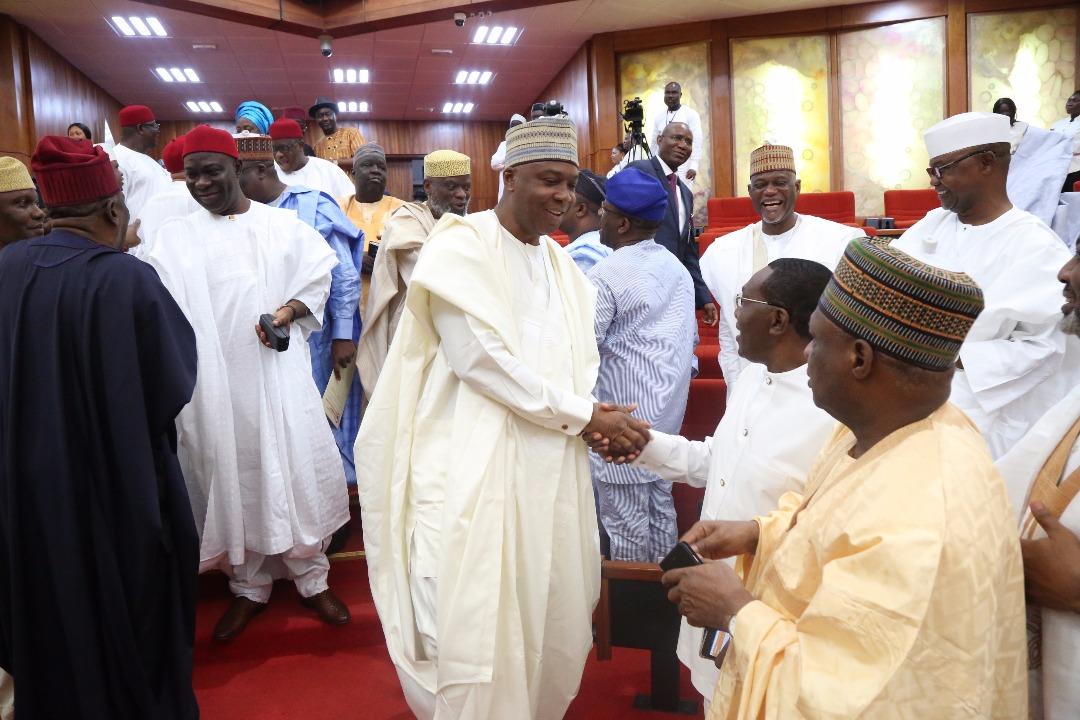Justice Ahmed Mohammed of the Federal High Court Abuja, on Wednesday gave an order restraining the National Assembly from taking steps to pass into law the Electoral Amendment Bill, 2018.
Justice Mohammed who granted the preservative order specifically ordered the defendants to maintain status quo ante belum pending the next adjourned date fixed for Tuesday 20, March, 2018.
Justice Mohammed gave the order while delivering ruling on an oral application for preservative order brought by the plaintiff (Accord Party) seeking the court’s intervention on the matter.
The judge ruled that there was need to preserve the res of the matter.
“In view of the provisions of section 58, subsection 5 of the 1999 constitution which empowers the National Assembly to veto the president withholding of his assent by a two-third majority votes, the court is simply to preserve the rest in other to safeguard the integrity of the court and the sanctity of the judiciary under section 6 (6) of the 1999 constitution.
” The parties are therefore ordered to maintain status quo ante belum between now and the next adjourned date. Hearing notice are to be served on the second defendant who is absent in court “, he ruled.
In the motion filed pursuant to order 26, rules 1,2$3 and order 18, rule 1 of the Federal High Court, the plaintiff prayed for an interlocutory injunction restraining the President of the Federal Republic of Nigeria from assenting to the Electoral Act amendment bill, 2018 as passed by the first defendant, pending the final determination of the substantive originating summons.
Secondly the plaintiff had sought a further order of interlocutory injunction restraining the 1st defendant (National Assembly) from taking any further action or actions on the bill titled, ‘Electoral Act amendment bill, 2018, particularly, to convene to pass the said bill by two-third majority of each of its two Chambers, pending the final determination of the substantive originating summons.I am
Read Also:
In the Originating Summons marked FHC/ABJ/CS/232/2018, the plaintiff 8 issues for determination by the court, including : Having regards to the combined provisions of sections 79,116,118,132,153,160(1) and 178 of the 1999 constitution as amended, the constitution read together with paragraph 15(a) of the third schedule to the same constitution, whether the 3rd defendant ( Independent National Electoral Commission) is not the only institution or body constitutionally vested with the powers and vires to organized, undertake and supervised elections to the offices of the president, the vice president of the federal republic of Nigeria, the Governor and deputy governor of a state, the membership of the Senate, the House of Representatives and the House of Assembly of each state of the federation, including fixing the sequence and dates of the elections to the said offices?
Considering the combined provisions of
sections 79,116,118,132,153,160(1) and 178 of the 1999 constitution as amended, the constitution read together with paragraph 15(a) of the third schedule to the same constitution, whether the 1st defendant (National Assembly) possesses the powers ans vires to propose any bill or pass any bill into an Act which directs or purport to direct, mandates, or purport to mandate, dictates or purport to dictate to the 3rd defendant to follow a particular sequence in the organization and conduct of elections to the offices of President and vice president, the Governor and deputy governor of a state, the membership of the Senate, the House of Representatives and the House of Assembly of each state of the federation?
Whether having regard to the exercise by the 3rd defendant of its powers and in furtherance of its function and duty to organize, undertake and supervise all elections to the offices of the
President and vice president, the Governor and deputy governor of a state, the membership of the Senate, the House of Representatives and the House of Assembly of each state of the federation, as prescribed by sections 76(1), 116(1), 132(1), 153(1)(f) and 178(1) and sections 25 and 30 of the Electoral Act, 2010 and having come out with or announced a schedule or time table for 2019, general election, the 1st defendant can later make a law to re-order, or prescribed a schedule inconsistent with the schedule or order earlier on made by the 3rd defendant under legislation which were at the time of the exercise valid and extant ?




